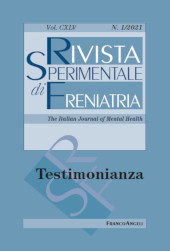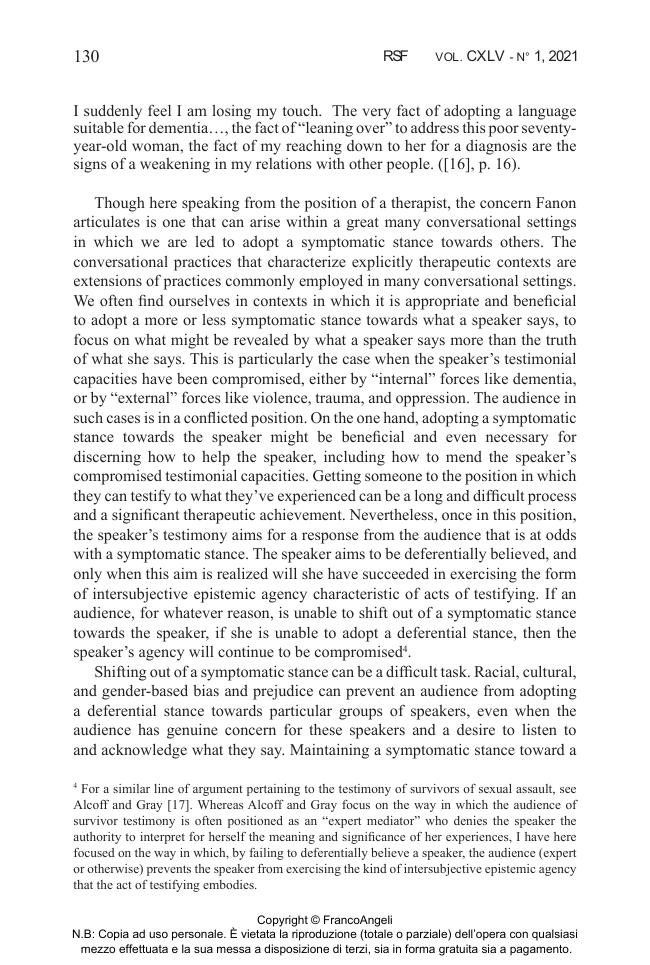Why testimony? : trauma, credibility, and the work of truth-telling
119-140 p.
The act of testifying or truthtelling has important therapeutic potential for victims of trauma and oppression. Perhaps surprisingly, however, this potential can be compromised by an audience's taking an overly therapeutic stance towards victims. In aiming to be believed, to be deemed credible and trustworthy, victims of trauma and oppression aim to be granted the power and authority to settle for their audience questions concerning the truth of what happened. Being granted such power and authority can go some way towards restoring the agency and humanity that was attacked by the crimes perpetrated against them, but the nature of this power and authority is such that an audience cannot grant it at will as part of a victimcentered therapeutic project. The successful exercise of this power requires a distinctive and particularly demanding form of belief on the part of the audience, what I call deferential belief.
Deferential belief requires that an audience grant the speaker the authority to settle for the audience questions concerning what is true, and as such it requires viewing the speaker as genuinely credible and trustworthy. Unfortunately, the social contexts in which truthtelling is so important are often contexts in which this demanding form of belief is difficult to achieve, no matter how much sympathetic listening and acknowledgment occurs. [Publisher's text].
L'atto di testimoniare, di affermare la verità, ha un potenziale terapeutico importante per le vittime di traumi e oppressione. Forse sorprendentemente, comunque, questo potenziale può essere inficiato se chi ascolta adotta un atteggiamento eccessivamente terapeutico. Mirando ad essere credute, giudicate credibili e degne di fiducia, le vittime di traumi e oppressione cercano di ottenere il potere e l'autorità di dirimere per chi le ascolta le domande sulla verità di ciò che è successo loro. Acquisire tale potere ed autorità può fare moltissimo per recuperare il senso di libero agire e di dignità umana attaccati dai crimini perpetrati contro di loro, ma la natura di tale potere e autorità è tale che non può essere dispensata a piacere da un auditorio parte di un progetto terapeutico incentrato sulle vittime. L'esercizio efficace di tale potere richiede una forma di accredito speciale e particolarmente impegnativo da parte di chi ascolta, che chiamerò di fiducia deferente.
La fiducia deferente implica che un uditorio accordi a chi parla l'autorità di dirimere le domande su ciò che è vero e ciò richiede che chi parla sia visto come genuinamente credibile e degno di fiducia. Sfortunatamente, i contesti sociali in cui dire la verità è così importante sono spesso contesti in cui questa impegnativa forma di accredito è difficile da realizzare, per quanto si cerchi di ascoltare in maniera empatica e validante. [Testo dell'editore].
Ist Teil von
Rivista sperimentale di freniatria : la rivista dei servizi di salute mentale : CXLV, 1, 2021-
Artikel aus derselben Ausgabe (einzeln erhältlich)
-
Informationen
ISSN: 1972-5582
THEMENBEREICHE
KEYWORDS
- Testimonianza, trauma, giustizia riparativa, terapia, autorità, credibilità
- Testimony, trauma, restorative justice, therapy, authority, credibility



